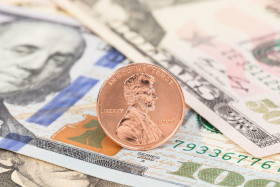The US dollar is slumping toward the end of the trading week after the Federal Reserve announced a new approach to inflation that would keep interest rates lower for longer. The greenback is also in the red after initial jobless claims topped one million for the second consecutive week. With inflation almost certain for the next few years, does this spell bad news for the buck?
Fed Chair Jerome Powell announced a major policy shift during a prepared virtual speech at the annual Jackson Hole symposium. After weeks of speculation, Powell revealed what the US central bank intends to do moving forward. According to the head of the Eccles Building, the Fed will adopt a new approach to inflation that would keep interest rates lower for longer.
As part of ârobust adjustmentsâ to the Statement on Longer-Run Goals and Monetary Policy Strategy, Powell confirmed that the Fed formally agreed to a policy of âaverage inflation targeting.â This would enable the central bank to allow inflation to run âmoderatelyâ above the target rate of 2% âfor some timeâ after periods when it was coming in below that target.
Ultimately, the Fed will no longer feel compelled to raise rates when the unemployment rate drops, but only if inflation does not spike. This is a transition from conventional thinking that low joblessness typically leads to higher levels of inflation. He did not cite a specific goal for the unemployment rate, choosing to let the market determine what is full employment.
Many find it counterintuitive that the Fed would want to push up inflation. However, inflation that is persistently too low can pose serious risks to the economy.
[The situation] can lead to an unwelcome fall in longer-term inflation expectations, which, in turn, can pull actual inflation even lower, resulting in an adverse cycle of ever-lower inflation and inflation expectations.
Powell thinks that this could also signal improvements for low- and moderate-income communities.
This change may appear subtle, but it reflects our view that a robust job market can be sustained without causing an outbreak of inflation.
Financial markets reacted positively to the news as the leading stock indexes opened the session in the green. But the metal commodities also climbed on the news. Gold and silver prices have been popping on inflation fears since the Fed, as well as other central banks worldwide, have embarked upon an unprecedented and unlimited multi-trillion-dollar quantitative easing campaign.
On the data front, the number of Americans filing for first-time unemployment benefits came in above one million for the second week in a row. Initial jobless claims reached 1.006 million, slightly higher than the median estimate of one million.
Continuing jobless claims hit 14.535 million, while the four-week average, which eliminates week-to-week volatility, was 1.068 million in the week ending August 22.
The gross domestic product (GDP) growth rate cratered 31.7% in the second quarter, coming in lower than the -32.5% forecast.
The US Dollar Index, which measures the greenback against a basket of currencies, also slumped following the Fed Chairâs comments. The index declined 0.2% to 92.82, from an opening of 92.85.
The USD/CAD currency pair dropped 0.28% to 1.3108, from an opening of 1.3144, at 13:23 GMT on Thursday. The EUR/USD advanced 0.5% to 1.1891, from an opening of 1.1831.
If you have any questions, comments, or opinions regarding the US Dollar, feel free to post them using the commentary form below.



Be First to Comment